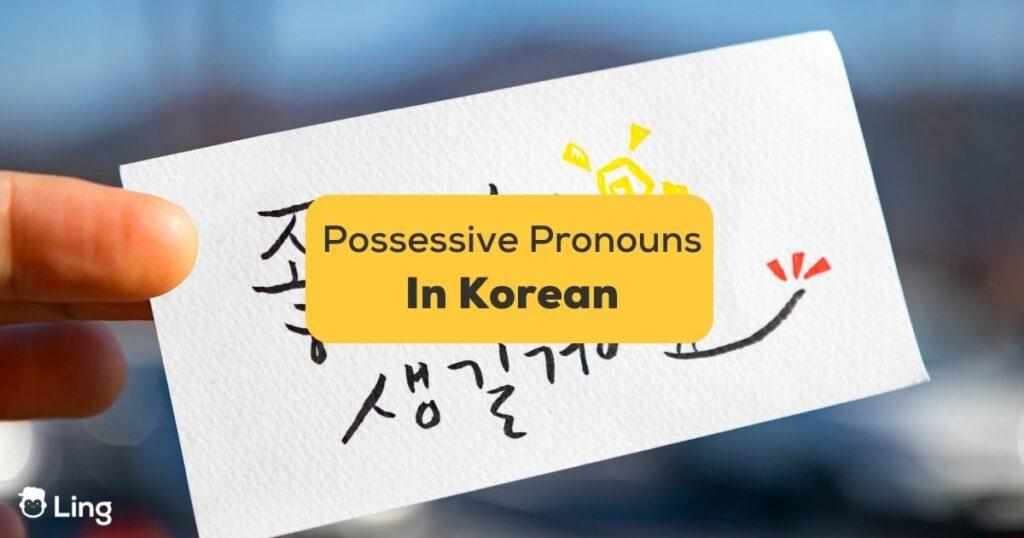Diving headfirst into the whirlwind world of Korean can feel like you’ve landed on the set of the movie Upside Down. But don’t worry, I’m here to make it easier for you. Korean possessive pronouns are like the hidden gems in your grandma’s jewelry box, just waiting to be discovered!
These bad boys are the unsung heroes that help clarify who owns what, sort of like how your bestie helps you remember where you left your phone after a night out. ‘My,’ ‘your,’ ‘his,’ and ‘hers’ are all part of this fabulous club, ready to add that possessive pizzazz to your sentences. And you should learn them too, In Korean! So, chingus, get ready because we’re about to get on a totally epic possessive pronoun adventure!

What Is Possessive Pronouns In Korean?
In Korean grammar, possessive pronouns are known as “소유 대명사” (soyu daemyeongsa). And I know what you’re thinking, “Uhh, come again?” Just picture these possessive pronouns as your personal squad of elves, ready to sprinkle some ownership magic on your sentences.
Let’s break it down. ‘My,’ ‘your,’ ‘his,’ and ‘hers’ in Korean are: ‘나의’ (naui), ‘너의’ (neoui), ‘그의’ (geueui), and ‘그녀의’ (geunyeoui) respectively. You can shorten them like this: ‘나’ (na), ‘너’ (neo), ‘그’ (geu), and ‘그녀’ (geunyeo), as Koreans naturally do during conversations.
These guys have one mission and one mission only: to latch onto a noun like a koala to a eucalyptus tree, making sure there’s zero confusion about whom the noun’s boss is.
They’re the unsung heroes of the communication world, and trust me, you don’t want to mix them up! I mean, imagine the absolute horror of accidentally declaring yourself the proud owner of your BFF’s shiny new ride or, even worse, their adorbs fur baby poodle. Yikes!
Here are some handy methods to help you remember the Korean possessive pronouns:
- ‘나의’ (naui), or ‘my,’ sounds like ‘nigh,’ and it’s close to you because it belongs to you.
- ‘너의’ (neoui), or ‘your,’ sounds like ‘no way’ with a heavy accent, almost like ‘noei.’ Think of someone trying to take something that’s yours, and you’re telling them, “No way!”
- ‘그의’ (geueui), or ‘his,’ sounds like ‘gooey.’ This can remind you of something of his being gooey.
- ‘그녀의’ (geunyeoui), or ‘hers,’ sounds like ‘gun you we.’ Imagine a woman saying, “It’s ‘gun you we,’ not yours!”

Korean Possessive Pronouns
Let’s dive in a bit deeper into the wonderful world of Korean possessive pronouns. Roll up your sleeves because it’s about to get a little possessive in here!
But before that, remember that in most cases, you can totally omit the subject or object, and thus the possessive pronoun, if it is already clear from the entire context of the conversation. But since we’re learning, you will see some sentences in which these pronouns are used.
First Person Possessive Pronouns
‘I’ in korean is ‘나’ (na) and if we want to say “me, myself, mine” you can use ‘나의’ (naui) in a more casual and less formal way, and ‘저의’ (jeo-ui) as a formal and polite version, which translates to ‘my’ or ‘mine.’
Picture yourself at a karaoke night, your favorite song starts playing, you grab the mic, and proclaim, “나의 노래!” (naui nolae!), which means “My song!” At that moment, you’ve staked your claim – that song is yours, and no one can take it from you!
Now, there’s something important you should know if you want to go around South Korean streets speaking like a local. ‘나의’ (naui) is the casual first-person pronoun, but in everyday conversations, people will shorten this word as ‘내’ (ne). And the polite version would be ‘저의’ (jeo-ui), shorten as “저” (jeo).
We will use the form ‘내’ (ne), in the following sentence examples of how to use the term.
- “내 책이에요” (Nae chae-gieyo) – This means “It’s my book.” Use the short form of ‘나의’ (naui), ‘내’ (ne) to express ownership, just like you might do while pointing to a book on a table to clarify that it belongs to you.
- “내 차 크에요” (Nae cha keueyo) – This means “My car is big.” ‘내’ (ne) is used to communicate that you are referring to your own car, not someone else’s.
Note: Have in mind, that sometimes Koreans instead of saying ‘내’ (ne) they will use “우리” (uri), meaning ‘ours.’ For example, instead of saying “my house,” they will say “우리 집” (uri jib) – “Our house.” This is because the person might not be the only owner of the house, and also because their sense of belonging is more about sharing with others.
Second Person Possessive Pronouns
Moving on to the second-person possessive pronouns, we’re talking about “you” and everything that belongs to “you.” In Korean, this translates to ‘너의’ (neoui). The informal contraction of this term is ‘니’ (ni) or ‘네’ (ne).
But before we explore this term a bit more, you need to know and understand that you should try to avoid using the word ‘너’ (neo) at any cost if you are talking with strangers. Try using the person’s name instead to be safe.
Younger Koreans might use “너의” (neoui) when talking to their older close friends as they don’t want to be overly formal, but at the same time they want to keep a certain degree of respect.
Additionally, you might often hear ‘니’ (ni) or ‘네’ (ne) in colloquial speech, but, again, be extra careful if you decide to use it. Make sure you are close with the person you are talking to first.
Here’s an example:
“너의 책” (neoui chae) can be shortened to “네 책” (ne chaek) or “네 책” (ne chaek). This phrase means: “your book.”
And another example:
“너의 차가 어디에 있어요?” (Neoui cha-ga eodie isseoyo?) – This translates to “Where is your car?” Here, ‘너의’ (neoui) is used to ask about the location of the other person’s car.
If you use the contracted version of the pronoun, it would be “네 차가 어디에 있어?” (Ne cha-ga eodie isseo?).
Third Person Possessive Pronouns
Lastly, let’s move to the third person possessive pronouns, encompassing ‘he,’ ‘she,’ and ‘it.’ In Korean, ‘his’ translates to ‘그의’ (geueui), and ‘hers’ is ‘그녀의’ (geunyeoui).
Here are some example sentences:
- “그의 집은 어디에 있어요?” (Geueui jib-eun eodie isseoyo?) – This translates to “Where is his house?” ‘그의’ (geueui) is used to ask about the location of a male individual’s house.
- “그녀의 책은 무엇인가요?” (Geunyeoui chaekeun mueosingayo?) – This means “What is her book?” Here, ‘그녀의’ (geunyeoui) is used to ask about the content or subject matter of a female’s book.
Learn Korean With Ling
And there you have it, my Korean language-loving friend! We’ve just gone on a tour of the absolutely crucial world of Korean possessive pronouns. Mastering the art of ‘너의’ (neoui), ‘그의’ (geueui), and ‘그녀의’ (geunyeoui) is like unlocking the secret level in a video game, moving you that much closer to becoming the ultimate Korean language pro.
But wait, there’s more! To truly level up your Korean skills, hit up the App Store or Google Play Store and download the Ling app, stat! This app is like having a mini korean language buddy in your pocket, ready to clarify the complexities of Korean at your own pace and wherever your adventures might take you. Let Ling be your trusty sidekick on this epic quest for Korean language greatness. You got this!


































































